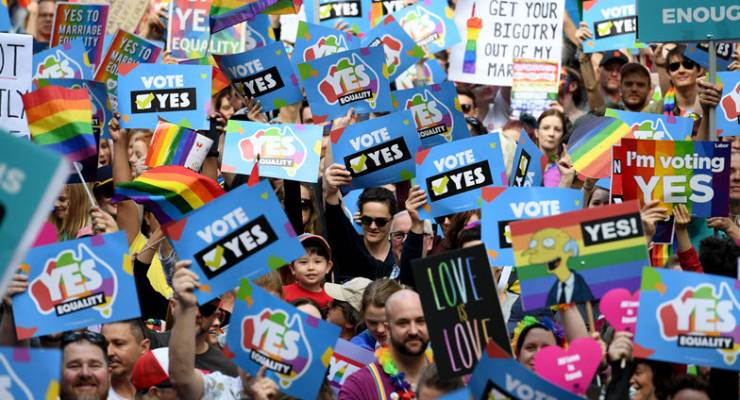
Democracy went backwards across the world in 2017, but advanced in Australia. This appears attributable to the successful democratic rejection of the old marriage laws.
The Economist Intelligence Unit revealed yesterday that Australia has moved to eighth place on its Global Democracy Index, up from tenth last year.
The Index “provides a snapshot of the state of democracy worldwide for 165 independent states … based on five categories: electoral process and pluralism; civil liberties; the functioning of government; political participation; and political culture.”
Australia has now snuck ahead of Finland and Switzerland. Its eighth ranking is behind (in order) Norway, Iceland, Sweden, New Zealand, Denmark, Ireland and Canada.
This is a welcome turnaround for Australia which has tumbled on virtually all global rankings since 2013.
Australia is now one of only 19 “full democracies”. These are the countries with secure basic political freedoms, respect for civil liberties, diverse and independent media, and an incorruptible judiciary whose decisions are enforced.
The report noted that Australia and Taiwan both legalised gay marriage in 2017. “However, the lesbian, gay, bisexual and transgender (LGBT) community continues to face significant difficulties in other parts of Asia.”
Asian democracies had a tumultuous year, according to The Economist:
A region that had made rapid progress up the rankings in recent years experienced the biggest decline of all regions between 2016 and our latest assessment … It also remained the region with the biggest deviation in scores among its countries. Top-scoring New Zealand (9.26) ranked fourth in the global Index, while persistent laggard North Korea (1.08) ranked 167th. Australia and New Zealand remained the only two ‘full democracies’ in the region as a whole.
Australia’s overall score is back to 9.09, exactly where it was in 2006 when the Index began. It rose from 9.09 in 2008 to peak at 9.22 in 2010 where it stayed for three years, before a dip in 2013 to 9.13. The Abbott years plumbed the depths, down to 9.01 for the three years 2014 to 2016.
Other report findings include:
- Overall, the global average score slipped again, declining from 5.52 in 2016 to 5.48 (on a scale of 0 to 10). Scores fell in 89 countries, increased in 27 and stayed the same in 51. That’s the worst outcome since 2010-11 during the global financial crisis.
- Democratic world champion is Norway again. “The Nordics occupy the top three spots, with Iceland and Sweden taking second and third place.”
- Star riser was The Gambia, upgraded from an “authoritarian regime” to a “hybrid regime”, zooming up from 143rd to 113th place, after 22 years of Yahya Jammeh’s dictatorship ended.
- Worst performer was Indonesia, falling from 48th to 68th position. India fell ten places, from 32nd to 42nd.
- For the second year, the US did not make to the list of “full democracies”, but was classed as a “flawed democracy”, due mainly to “a serious decline in public trust in US institutions in 2016”.
- The US has “a disjuncture between still generally high levels of public support for democracy across the globe and deep popular disappointment with the functioning of democracy and systems of political representation”.
- In both Europe and the US, whereas 2016 was notable for populist revolts against mainstream politics, 2017 experienced a backlash against populism. Evidence for this included the campaigns to reverse the Brexit result and unseat President Trump.
- Specifically, in the UK, “an assortment of pro-European lawyers, politicians, journalists and educational professionals fought a rear-guard action in the courts, the House of Commons and the House of Lords to delay, amend or stymie government legislation aimed at implementing the referendum vote to leave the EU”. And in the US, “Democratic Party activists, sections of the media, university professors and students” refused to accept the outcome of the presidential election, demanding that Trump “be impeached on the grounds that he was unfit for the highest office.”








But our major party politicians are virtually owned by corporate donors, and still in thrall to neoliberal economic policies which voters loathe. Also, no bill of rights. Not as democratic as we should be.
Correct, Xoanon. Nor as democratic as you were. But getting better:
“Australia’s overall score is back to 9.09, exactly where it was in 2006 when the Index began. It rose from 9.09 in 2008 to peak at 9.22 in 2010 where it stayed for three years, before a dip in 2013 to 9.13. The Abbott years plumbed the depths, down to 9.01 for the three years 2014 to 2016.”
No wonder some people are Lennonists, “keep you drugged with religion, sex & TV”.
Too many people are too close to managing to boil the baby in the bathwater in the hope of it not being noticed.